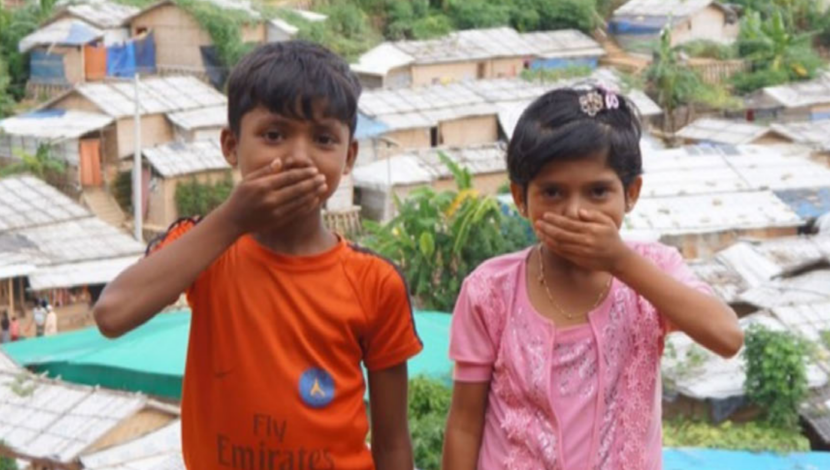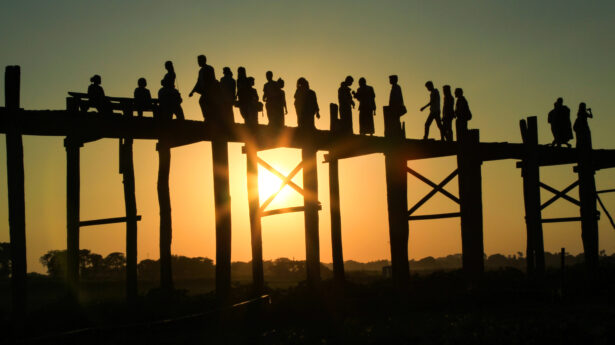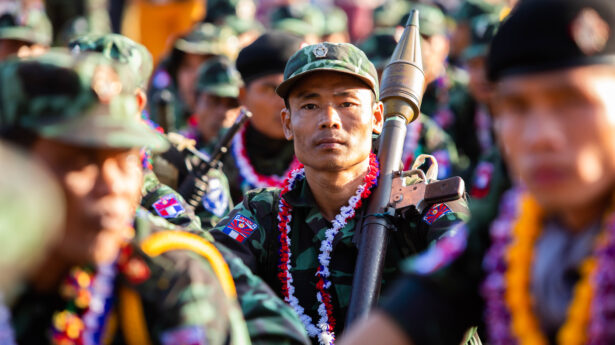The Unitarian Universalist Service Committee advances human rights through grassroots collaborations.
Rohingya Language Project Addresses the Cultural Costs of Genocide

By on April 6, 2023
When we think of genocide, we often consider the loss of human life. However, the violence and dehumanization of genocide can take much more. Culture, traditions, livelihoods, religious practices, families, and communities also suffer as a result of genocidal violence.
Since 2017, Rohingya Muslims in Burma (Myanmar), have experienced brutal violence at the hands of the nation’s military. Nearly six years later, thousands of lives have been lost, villages and communities destroyed, women raped, children orphaned, and families torn apart. There are roughly one million Rohingya refugees living in camps in Bangladesh as a result of the genocide.
UUSC partner Community Rebuilding Centers (CRC) completed a research study in 2022, First They Targeted Our Culture and Language, that provides a startling analysis of years-long efforts by the Burmese military and government to eradicate Rohingya language and cultural practices. Twenty-three Rohingya researchers conducted 285 interviews to assess how the language and culture of the Rohingya people are regularly assailed by those in power.
Watch this video to understand the conclusions from the report and recommendations for moving forward.
Below are the recommendations from the report and what can be done to preserve the Rohingya language and culture.
To the Rohingya Community in Bangladesh and Beyond:
- SPEAK Rohingya language when you talk to your friends, relatives and other members in the community.
- PRACTICE Rohingya when you talk to your children and other family members at home.
- DISCUSS the importance of Rohingya language preservation with others in your community.
- TEACH Rohingya to your children at mosques, madrassas and other learning centres.
- ENCOURAGE your friends and colleagues to speak Rohingya in the refugee camps and beyond.
- PARTICIPATE in projects that preserve Rohingya language and culture as a means of protecting Rohingya identity.
To the Humanitarian Organisations in Bangladesh:
- HALT the practice of using Bangla and Chittagonian terms in education campaigns, awareness sessions, and publications that target the Rohingya refugee community.
- RECRUIT qualified Rohingya individuals when verbal or written translation is needed.
- PERFORM reviews of existing materials to ensure the full use of Rohingya language.
- REQUIRE that education for Rohingya youth in learning centres around the camp is conducted in Rohingya language.
- SUPPORT the Rohingya community and Rohingya CSOs in preserving Rohingya language and culture.
- ENSURE that considerations for the preservation/protection of Rohingya language and identity are integrated into all programming in the refugee camps.
To the Myanmar National Unity Government (NUG):
- RESTORE Rohingya citizenship immediately, and recognize “Rohingya” as an official ethnicity.
- REPEAL formal and informal policies of persecution and discrimination against the Rohingya population at local, state, and national levels in Myanmar.
- HALT the current junta’s ongoing practices and policies of destruction of Rohingya villages, mosques, madrassas and other historical and cultural landmarks in Rakhine State.
- CREATE safe and secure environment for Rohingya ethnic inside Myanmar where they can freely perform cultural, traditional and other religious events in Myanmar.
- CHANGE the official government names of ancient Rohingya villages and other historical landmarks back to their original Rohingya names.
- CONSTRUCT AND SUPPORT a Rohingya National Museum for permanent preservation of Rohingya culture and language in Myanmar.
- SECURE a voluntary, safe and dignified repatriation of Rohingya refugees from Bangladesh’s refugee camps to their villages of origin in Rakhine State as soon as possible.
To the Government of Bangladesh:
- END the ongoing dominance of Bangla culture and language in the refugee camps, Cox’s Bazar and on Bhasan Char Island, including by refraining from speaking Bangla when dealing with the Rohingya refugee community.
- RECRUIT qualified Rohingya interpreters for the camp in charge (CIC) offices and units of the Bangladeshi armed security forces stationed in the refugee camps.
- REMOVE all restrictions on the Rohingya refugee community so that they can freely perform their cultural traditions and religious festivals and events across the refugee camps, including removing restrictions on freedom of movement and restrictions related to holding such events.
- ISSUE a statement with the purpose of ensuring the Bangladeshi authorities, armed security forces and the humanitarian organisations based in the refugee camps respect the culture, language, identity and dignity of the Rohingya refugee community.
To the International Community:
- ACTIVELY SUPPORT all efforts to hold the former Myanmar governments, current junta and individuals within the government accountable for the destruction of Rohingya culture, language and identity in Rakhine State, including through proceedings at the International Court of Justice, the International Criminal Court and national level prosecutions on the basis of universal jurisdiction on charges of genocide and crimes against humanity committed against the Rohingya people.
- EXERT PRESSURE on the current Myanmar junta, including through comprehensive use of targeted sanctions, to end the ongoing destruction of Rohingya villages, mosques, madrassas and other historical landmarks in Rakhine State, and ensure all members of the Rohingya community are able to speak their language and participate in their cultural and religious traditions freely inside the country.
- EXERT PRESSURE on the Bangladesh government to end restrictions on cultural events, freedom of movement, education, and employment in Bangladesh.
- DEVELOP binding international legal standards to protect culture and languages in conflictaffected zones and within displaced communities globally.

